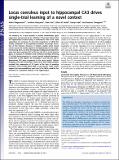Locus coeruleus input to hippocampal CA3 drives single-trial learning of a novel context
Author(s)
Abe, Kuniya; Wagatsuma, Akiko; Okuyama, Teruhiro; Sun, Chen; Smith, Lillian; Tonegawa, Susumu; ... Show more Show less
DownloadE310.full.pdf (2.269Mb)
PUBLISHER_POLICY
Publisher Policy
Article is made available in accordance with the publisher's policy and may be subject to US copyright law. Please refer to the publisher's site for terms of use.
Terms of use
Metadata
Show full item recordAbstract
The memory for a new episode is formed immediately upon experience and can last up to a lifetime. It has been shown that the hippocampal network plays a fundamental role in the rapid acquisition of a memory of a one-time experience, in which the novelty component of the experience promotes the prompt formation of the memory. However, it remains unclear which neural circuits convey the novelty signal to the hippocampus for the single-trial learning. Here, we show that during encoding neuromodulatory input from locus coeruleus (LC) to CA3, but not CA1 or to the dentate gyrus, is necessary to facilitate novel contextual learning. Silencing LC activity during exposure to a novel context reduced subsequent reactivation of the engram cell ensembles in CA3 neurons and in downstream CA1 upon reexposure to the same context. Calcium imaging of the cells reactivated in both novel and familiar contexts revealed that suppression of LC inputs at the time of encoding resulted in more variable place fields in CA3 neurons. These results suggest that neuromodulatory input from LC to CA3 is crucial for the formation of a persistent memory in the hippocampus.
Date issued
2017-12Department
Massachusetts Institute of Technology. Department of Biology; Massachusetts Institute of Technology. Department of Brain and Cognitive Sciences; Picower Institute for Learning and Memory; RIKEN-MIT Center for Neural Circuit GeneticsJournal
Proceedings of the National Academy of Sciences
Publisher
National Academy of Sciences (U.S.)
Citation
Wagatsuma, Akiko et al. “Locus Coeruleus Input to Hippocampal CA3 Drives Single-Trial Learning of a Novel Context.” Proceedings of the National Academy of Sciences 115, 2 (December 2017): E310–E316 © 2018 National Academy of Sciences
Version: Final published version
ISSN
0027-8424
1091-6490